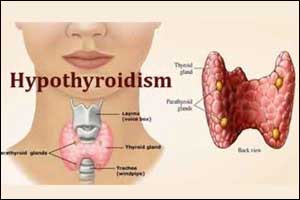- Home
- Editorial
- News
- Practice Guidelines
- Anesthesiology Guidelines
- Cancer Guidelines
- Cardiac Sciences Guidelines
- Critical Care Guidelines
- Dentistry Guidelines
- Dermatology Guidelines
- Diabetes and Endo Guidelines
- Diagnostics Guidelines
- ENT Guidelines
- Featured Practice Guidelines
- Gastroenterology Guidelines
- Geriatrics Guidelines
- Medicine Guidelines
- Nephrology Guidelines
- Neurosciences Guidelines
- Obs and Gynae Guidelines
- Ophthalmology Guidelines
- Orthopaedics Guidelines
- Paediatrics Guidelines
- Psychiatry Guidelines
- Pulmonology Guidelines
- Radiology Guidelines
- Surgery Guidelines
- Urology Guidelines
Is weekly levothyroxine as effective as daily therapy in patients with hypothyroidism?

Once-weekly levothyroxine (LT4) therapy is an effective alternative for patients with hypothyroidism compared with daily therapy, especially for those who have compliance issues, finds research published in the European Thyroid Journal.
Dr Rajput R and associates in a randomised, cross-over study, compared the effects of daily vs weekly LT4 alternative on thyroid function test (TFT) and quality of life (QoL) in patients with hypothyroidism.
In the study a total of 100 hypothyroid patients on a stable LT4 dose were divided into 2 groups of 50 each. In group I, patients were given daily therapy for 6 weeks and then shifted to weekly therapy for the next 6 weeks. In group II, patients were given LT4 once a week for 6 weeks and then switched to daily therapy for the next 6 weeks. TFT, quality of life (QOL), and hyperthyroidism symptom scale (HSS) score of patients were compared in each group at 0, 6, and 12 weeks.
The results showed that TFT remained within the normal range, but TSH increased (group I, daily 2.8 ± 1.4 mIU/L, weekly 3.9 ± 1.1 mIU/L, p = 0.001; group II, weekly 4.6 ± 1.1 mIU/L, daily 2.7 ± 1.2 mIU/L, p = <0.001) and T3/T4 decreased with weekly therapy as compared to daily therapy. No significant difference in HSS score was found between daily and weekly administration of LT4. With weekly therapy, QOL showed improvement in bodily pain, vitality, mental health, and social functioning.
The researchers concluded that Once-weekly LT4 administration is a reasonable alternative for patients, especially for those who have issues with compliance.“Our study shows that in today’s era of busy and hectic schedules where it is difficult for patients to take LT4 following a rigid schedule, once weekly LT4 administration provides an alternative approach for the treatment of hypothyroidism, especially in patients where compliance is a major issue,” the authors said.
For further reference log on to :

Disclaimer: This site is primarily intended for healthcare professionals. Any content/information on this website does not replace the advice of medical and/or health professionals and should not be construed as medical/diagnostic advice/endorsement or prescription. Use of this site is subject to our terms of use, privacy policy, advertisement policy. © 2020 Minerva Medical Treatment Pvt Ltd